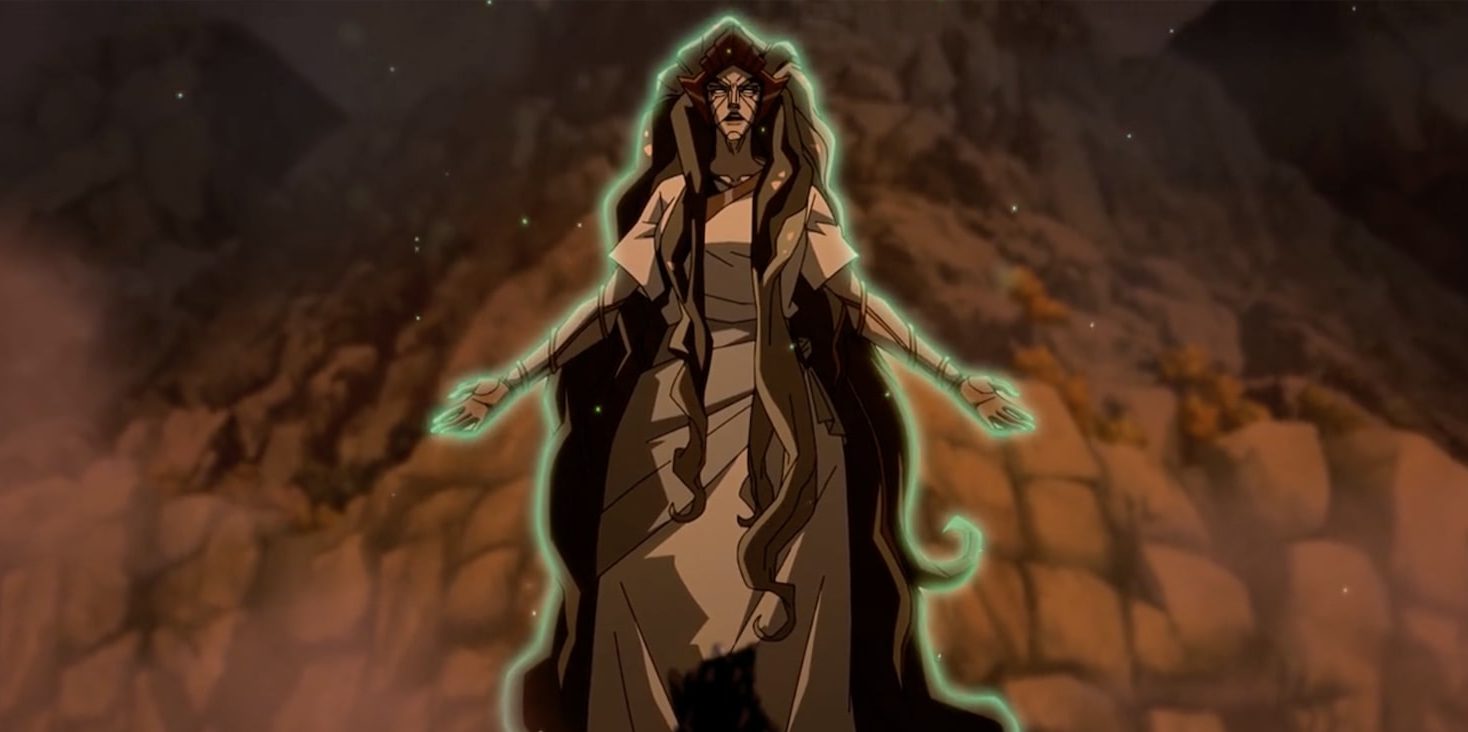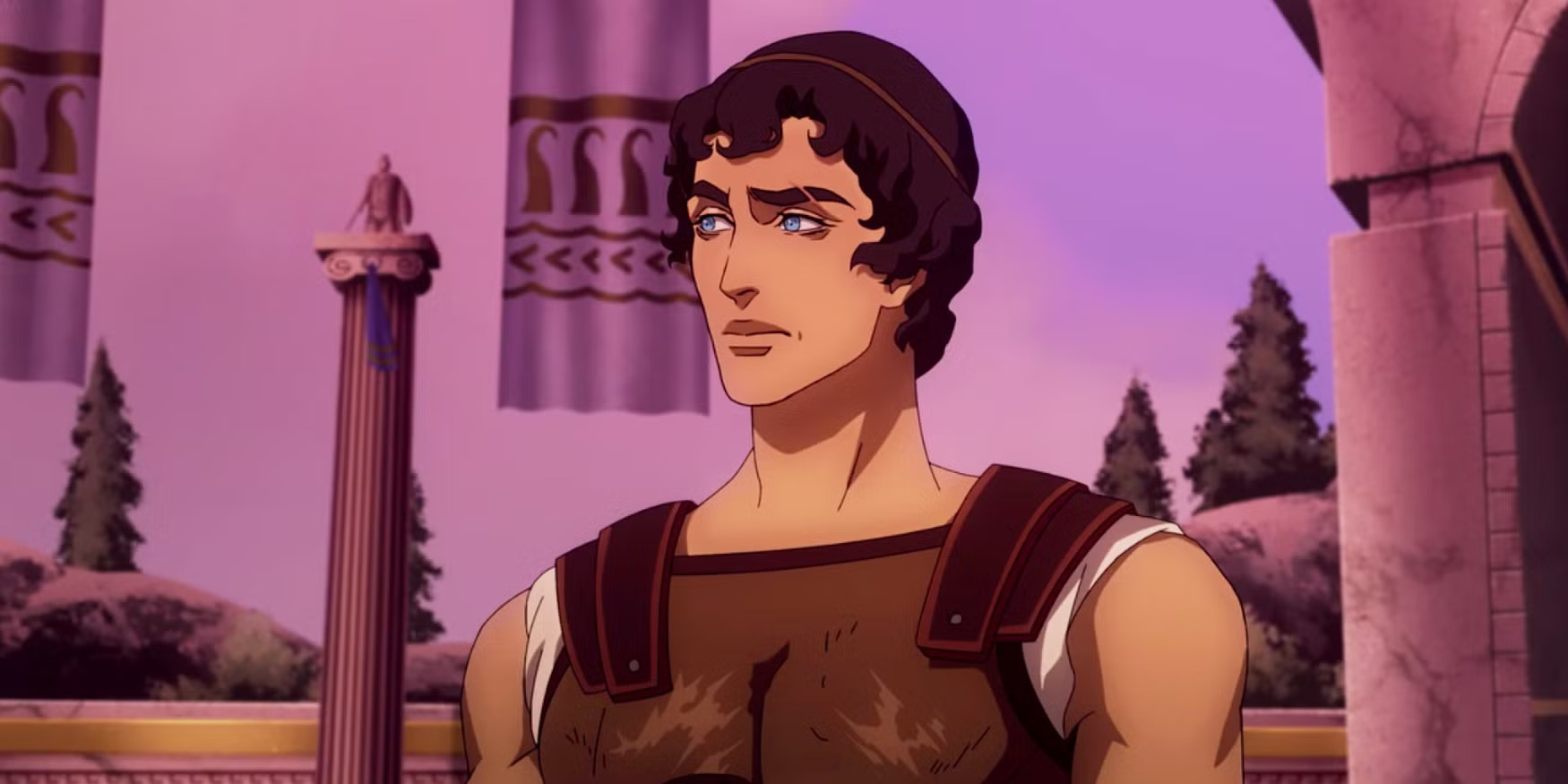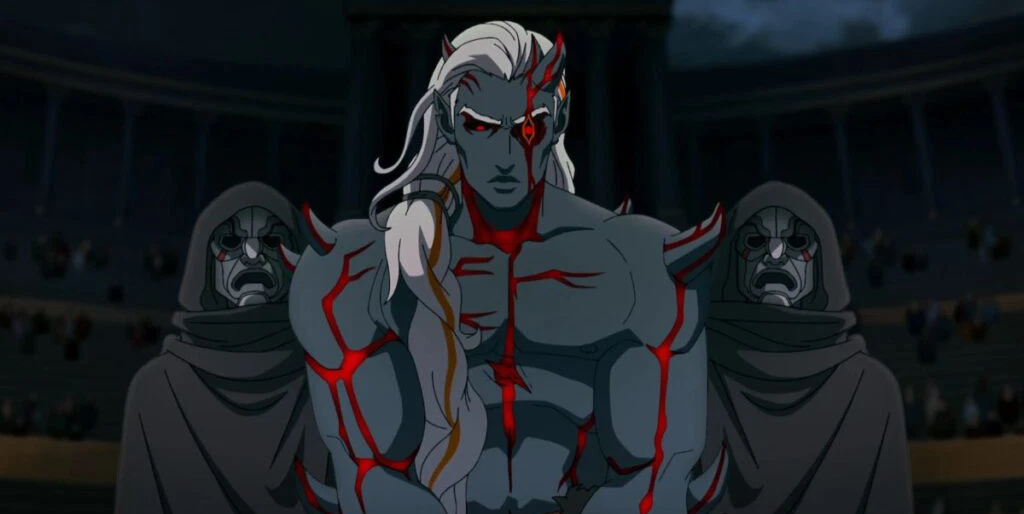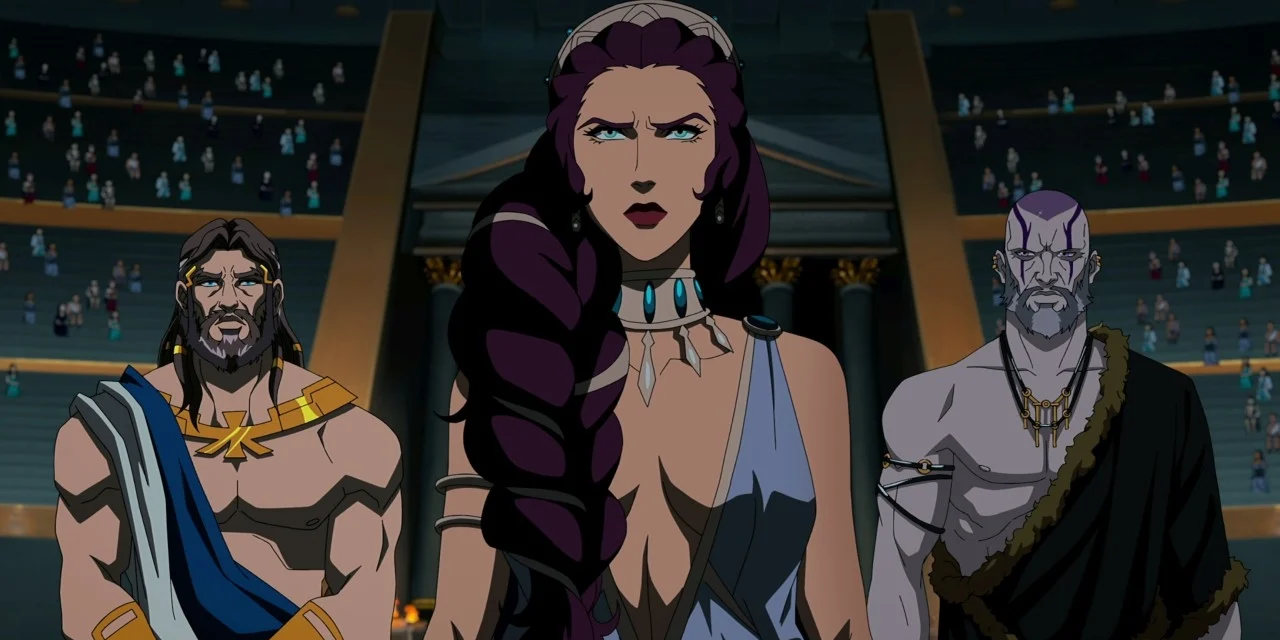The third season of ‘Blood of Zeus’ wraps up Heron’s journey toward greatness with a bombastic ending that touches on significant storylines and his complicated relationship with his brother, Seraphim. After being seemingly stabbed to death by Hades at season 2’s end and facing the threat of Typhon, Heron and the Olympians have to find a way to navigate the unprecedented challenges set in front of them while also learning a valuable lesson along the way. With Gods, Titans, and monsters facing each other in a cataclysmic war that could decide the world’s future, everyone has to come together for one final stand against the might of unassailable forces on the opposite side. It leads to an emotional conclusion as we finally see the conclusion to Heron and Seraphim’s quest and the latter’s redemption arc. SPOILERS AHEAD.
Blood of Zeus Season 3 Plot Recap
Season 3 kicks into gear with Heron waking up and pulling out Hades’ dagger from his wound. As he clings on to his last vestiges of life, Typhon, the great, fiery monster, enters the fray and starts wreaking havoc on the Gods. A few try to fight back, such as Ares and Hephaestus, losing their life in the process, while others decide to contain the damage, like Hermes. Hades and Persephone flee from the battlefield as Demeter decides to protect them by holding Typhon back for a while. However, the efforts of the different Gods lead to minuscule results in terms of restraining the giant beast. Eventually, all the eternal beings leave the site, and Typhon decides to pursue Hades and Persephone to the Underworld. His plan is to reunite with Cronos, the King of the Titans, who is trapped in Tartarus.

Although Hades and Persephone make it back to the Underworld in time, they are unable to break through the entrance because the latter cannot enter during spring. As a result, Persephone asks her husband to leave her behind so he can gather their children and escape. Hades is reluctant but has to accept his wife’s sacrifice. She defends herself against Typhon for a while as Hades saves his children. However, while taking them to a hidden part of his kingdom, he senses Persephone dying as Typhon strikes a fatal blow that kills her. Subsequently, the monster enters Tartarus and frees Cronos, who is told by Gaia previously that she unleashed Typhon and the Titans to restore order in the world. Upon his release, Cronos immediately starts to devote his resources to finding Zeus’ location because he wants to ensure the King of the Gods’ demise.
After leaving his children in a secluded spot, Hades is captured by Cronos, who uses his son’s bident to restore himself to full size. Next, he forces Hades to give up Zeus’ location, which the God of the Dead refuses to give up. To speed up the process, Cronos threatens to wipe away the souls of Ares and Hephaestus in the Underworld’s Abyss, which is a permanent death for all Gods. When Hades maintains his resolve, Ares and Hephaestus are killed. Persephone’s soul is brought into the fold, which causes a great dilemma for Hades. However, he is saved from making a choice when the Underworld’s judge, King Aeacus, offers to spill the secret. It turns out to be a ploy by Hera to distract Cronos while Demeter can help Zeus escape and hide in a secret part of the Underworld where he cannot be found. Meanwhile, Heron embarks on a perilous quest with his brother, Seraphim.
Blood of Zeus Season 3 Ending: Is Heron Dead Or Alive?
The majority of season 3 revolves around two storylines – Cronos and Typhon’s rampage across Greece and Heron helping Seraphim broker a deal to get his lover, Priestess Gorgo, into the Elysian Fields. In the latter, we see Heron grow closer to his half-brother as they both realize how much they are alike. Egged on by the prophecy he heard in season 2, Heron believes his time in the world is limited. Therefore, it is important for him to bridge his differences with Seraphim, who he believes could be the prophesized one. As such, he and Seraphim join forces to find a passage to the Elysian Fields for Gorgo. While they achieve their goal to a degree, things play out differently as they become pivotal figures in the final clash against the Titans. In the climactic clash with Typhon and Cronos, Heron makes the ultimate sacrifice by laying down his life to kill Typhon.

Heron’s final moments play out like a valiant hero martyring himself for a greater cause. It embodies his noble spirit and his growth as a character throughout the series. It also comes at great personal cost. Before stepping onto the battlefield as the champion of the Olympians, Heron is told by Demeter that she was the one who snipped his thread of life, effectively shortening his life. She explains that she did it because she wanted to punish Zeus for giving away Persephone to Hades and the Underworld. However, she feels ashamed about it now that she has reflected upon her actions. She tells Heron that he can sow back the thread to ensure he can have a happy life. When the demigod touches the thread, he sees a flash of his future life with a son and wife, who happens to be Alexia. It shows him that he has something bright in his path.
During the battle, Cronos and Typhon’s overwhelming strength pushes Heron and Seraphim to their limits. Having no other options, Heron uses his lightning powers in a final showdown against Typhon. As he unleashes the full breadth of his abilities, his life flashes through his eyes, including the one he saw with Alexia and his future child. Meanwhile, Alexia watches him with tearful eyes from the sideline as he rushes Typhon and takes down the monster in a grand act of self-sacrifice. His death inspires Seraphim to launch a final attack on Cronos, who is distraught that his most valuable monster has been obliterated. The small break in tension allows Zeus to swoop in and take command over the battlefield. The rest of the Olympians join in and take down the Titans, with Seraphim dealing the killing blow on Cronos.
It turns out that while Heron was taking down Typhon and Cronos, Hera and Demeter stole Hades’ bident and replaced it with an identical one. Subsequently, the bident was used to release Zeus and Hades from the Underworld, who then stepped in and ended the fight. Seeing his son sacrifice himself, Zeus releases his arsenal of lightning-infused rage on the Titans from a distance, who find themselves outnumbered by the resolute Olympians. Therefore, in its own way, Heron’s sacrifice paves the way for the Gods to embrace their better nature. In the final scene, we see Heron enter the Elysian Fields to reunite with his mother, who is deeply emotional about seeing him again. Even though he gives up his life with Alexia in the real world, Heron finds solace next to his mother in the Underworld.
How is Seraphim in the Elysian Fields? Does He Die?
While the scene in the Elysian Fields brings a sense of closure for Heron and Electra, it also surprisingly wraps up Seraphim’s story as well. After sharing a tender moment with her, Heron shows his mother that her second son is also joining her in the Underworld. However, it opens up questions regarding how Seraphim ended up there in the first place, as we do not see him dying in the final fight. After the battle against the Titans, Zeus proclaims Seraphim as the prophesized one. Statues are built in honor of Heron and Seraphim’s legacy on Mount Olympus, with the first personifying the moniker “Hero” while the latter would always be referred to as “the one.” It shows that the actions of the brothers were integral in rescuing the Olympian way of life and stopping the Titan threat.

One of the explanations behind Seraphim’s return to the Underworld could be that following his final acts of redemption, he forgives himself for his mistakes and gives up being a demon. As Hades handed Seraphim a vial of liquid at the end of season 2, which likely contained the cure to his demonic powers, it is possible that he drank the vial and lost his demon mark. Subsequently, the toll of his injuries and the physical extent to which he pushed his body far exceeded its capabilities, which may have resulted in his death. While it makes sense to a degree, another possibility could be that he killed himself to be reunited with his lover, Gorgo, who is a subject of the Underworld and beyond his reach. It is likely that after the final battle, he finally felt absolved of his sins and wanted to be with her any way he could. To that end, his dying would help him reconcile with her.
As we are never provided any indication of Seraphim dying in any way, it is hard to discern the exact circumstances that led to his passage to the Underworld. Because there are endless likelihoods, we may even imagine that he could have met his death in another battle following the war with Cronos. However, the only issue is that the timelines don’t line up. Both Heron and Seraphim walk into the Elysian Fields to meet their mother together, showcasing that they both somehow end up going through the judgment phase as a pair. This means that the scene takes place not long after the final battle. The most probable theory regarding his death is the one surrounding Gorgo. As seasons 2 and 3 dig deeper into Seraphim’s love affair with the priestess, it is more than likely he died to be with her in the Underworld.
Regardless of the events that led to him being in the Underworld, Seraphim’s presence in the Elysian Fields signifies that the Judges of the Underworld consider him redeemed. For much of the narrative, redemption is a big deal for Seraphim, mainly because he considers himself unworthy and tainted. He denies himself the freedom to fall in love and start a relationship with Gorgo due to a sense of guilt and regret over his violent nature. To that end, his final act of taking on Cronos and Typhon alongside his brother shows that despite his evil nature, he is a man of virtue and honor struggling to redefine his identity. His passage into the Elysian Fields cements his worth, highlighting that the judges think he deserves an eternity of peace for his actions.
Do the Olympians Reconcile?
Although the climactic battle resolves the great conflict against the Titans, the final parts of the story focus on the Olympians recognizing their deficiencies and acknowledging how their flaws opened the path for Olympus to be put under threat. For instance, the entire story is a result of Zeus philandering with mortal women, breaking up innocent families, and seeding thoughts of intense jealousy in his wife, Hera. She herself is also to blame for escalating things too far without honestly acknowledging her feelings and having tough discussions with her husband. The same is true for all the other Gods, including Hades, Persephone, Demeter, and many more. Because of their irreverent and egoistical mindset, they nearly brought about the end of the world. In fact, if not for two mortal heroes (Heron and Seraphim), they would have been doomed forever.

The blame for much of the conflict raging throughout the story starts because the Pantheon cannot control itself properly and exercise restraint where it should. Gaia pinpoints their central issue as a lack of forgiveness. After living thousands of years as all-powerful beings, the Gods have grown vain and ponderous. They meddle wherever they can without any good reason, turning the lives of innocents into absolute hell. Yet, when push comes to shove, they also do not realize the value of compromising and forgiving the other side after mistakes are made. As a result, they are caught up in an endless cycle of violence, aggression, and a desire for punishment, like bickering children. Titan Gaia unleashes Typhon in the first place because of the selfish and self-centered attitude of the Gods.
Once Cronos and his lackeys begin taking over everything, the Olympians finally realize the folly of their actions. Their endless fighting leaves them defenseless and unable to mount any sort of meaningful counter-attack against their enemies. Their personal ambitions and blinding rage are what hamstring them from realizing that there is more to gain from working together than constantly opposing. In contrast to them, Heron is noble and willing to sacrifice himself for something greater than himself. To that end, his final act of taking down Typhon while giving up his life shows the Gods how they should be acting rather than how they have been in the past. It serves as a crossroads moment for them and one that they must rectify to avert any similar future crisis.
Read More: Where is The Eternaut Filmed? Shooting Locations of the Netflix Show


